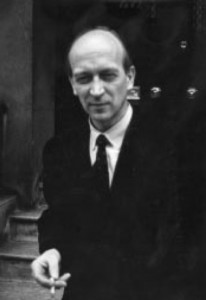October 15th, 2011 by Bryan Vartabedian, M.D. in Opinion
1 Comment »

I woke up this morning, tapped my digital signal, and found this from Brian McGowan on Twitter: “What happens when complexity races ahead of the mind’s ability to adapt? When progress outpaces evolution? We need new solutions.”
Like a slow hunch, a version of this idea has been rattling around in my head for some weeks. Specifically: Is there a new kind of human intelligence evolving? Will our ability to work with knowledge in the face of limitless information select for a new kind of thinker in the 21st century? I suspect it will. Thinking and the creation of new ideas will require Read more »
*This blog post was originally published at 33 Charts*
October 2nd, 2011 by Bryan Vartabedian, M.D. in Opinion
No Comments »

Doctors have an image problem. People see us one way. Perhaps more importantly, we see ourselves one way. And it seems to start at a young age.
I had a premedical student in my office recently – A friend of a friend interested in a career as a doctor. And as I often do I like to ask the question, ‘what do you think medicine will be like when you’re done training?’ It’s something of an exercise. I usually get an answer involving some combination of hospital rounds, physical examinations, telephone calls, and busy office visits. Occasionally I’ll get rehearsed nonsense about black leather bags and house calls. The young woman in my office didn’t fail to deliver.
What does the next generation of physician know? Read more »
*This blog post was originally published at 33 Charts*
September 28th, 2011 by Bryan Vartabedian, M.D. in Opinion
No Comments »

 It seems that there are medical schools taking the initiative to help their students become more compassionate. It’s a worthy goal but I don’t know if it’s possible. We can teach individuals to act compassionate. But that, of course, is different from being compassionate. While there may be literature to support the cause, I don’t think that a curriculum can cultivate empathy.
It seems that there are medical schools taking the initiative to help their students become more compassionate. It’s a worthy goal but I don’t know if it’s possible. We can teach individuals to act compassionate. But that, of course, is different from being compassionate. While there may be literature to support the cause, I don’t think that a curriculum can cultivate empathy.
Is it possible to change a student or doctor’s heart? Of course, I see it all the time. But not from role playing or small groups. It’s human circumstances that drive change. Personal loss and life experience tempered by introspection and humility change how we see those around us. It’s only when we recognize our own vulnerability that we can begin to see it in others. This doesn’t happen in a classroom. Read more »
*This blog post was originally published at 33 Charts*
September 14th, 2011 by Bryan Vartabedian, M.D. in Better Health Network
No Comments »

 “There is already plenty of evidence to show that we are in danger of losing our clinical heritage and of pinning too much faith in figures thrown up by machines. Medicine must suffer if this tendency is not checked.”
“There is already plenty of evidence to show that we are in danger of losing our clinical heritage and of pinning too much faith in figures thrown up by machines. Medicine must suffer if this tendency is not checked.”
– Paul Wood, MD January 1950
These words from Dr. Paul Wood are interesting. Wood was a mid-twentieth century master cardiologist out of the UK. His story is remarkable if you like those playing strong supporting roles in modern medical history. He’s the guy to the left posing with the cigarette.
I like the quote because it captures the insecurity doctors feel with change. It also supports Read more »
*This blog post was originally published at 33 Charts*
September 9th, 2011 by Bryan Vartabedian, M.D. in Opinion
No Comments »

In The Innovator’s Prescription Clayton Christensen details how technology is disrupting health care. He describes the provision of medical care as occurring on a spectrum ranging from intuitive medicine to precision medicine. Intuitive medicine is care for conditions loosely diagnosed by symptoms and treated with therapies of unclear efficacy. Precision medicine is the delivery of care for diseases that can be precisely diagnosed and with predictable, evidence-based treatments. Intuitive medicine is almost entirely dependent upon clinical judgment. Precision medicine not as much. 19th century medicine was intuitive; the 21st century will prove precise.
When we think about our role as doctors, we like to see ourselves as providers of intuitive medicine. It’s how we were all trained – products of 20th century mentoring. And so we see of ourselves just as indispensable as we were 100 years ago. But as medicine makes its march toward predictive care all of this will change.
There’s an endemic insecurity among the 21st century doctors: Read more »
*This blog post was originally published at 33 Charts*













